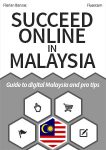After a few years of trough in the Vietnamese property market, real estate developers and sellers are facing a renewed buying trend. However, the Vietnamese market presents various peculiarities to understand in order to be a successful player, buyer, seller or intermediary when it comes to information and consumer behavior.
In this video, Russell Harlow, CEO of muabannhadat.com.vn answers the questions of FBNC Vietnam’s Tran Quoc Khanh on the real estate market in Vietnam.
Conveying trust for real estate marketing
Buying a first property is one the major decisions of anyone’s life. The Vietnamese, like everybody else, are therefore very cautious about such an investment, especially as the legal framework in Vietnam for properties and ownership is often unclear and can be confusing.
Therefore providing clear and reliable information, such as step-by-step guides on the property buying process (looking for property and property agents, financing the acquisition, etc.) is one key to educate potential buyers and build trust for real estate marketers on Internet.
Dishonest online sellers can list inaccurate information; it is the charge of Internet real estate portals to make sure certain information requirements are met for property submission, to control the accuracy of the information submitted and to prevent abuses of their service.
The Vietnamese real estate market
Target property buyer: the young professionals
The real estate market is coming back from a few troubled years, and property developers are optimistic, especially in the largest cities of Vietnam: Ho Chi Minh City and Hanoi. Developers now target their offer of new projects to the young professionals.
The interest from all developers towards this young, working class demographic gives them a lot of bargaining power to negotiate with sellers, but also with the banks to secure interesting loans and mortgages.
Vietnamese family tradition
The Vietnamese traditional culture creates a particular environment for real estate: the young professionals need housing, but the ones who have have the resources to buy it are often their parents. They often assist with the funding, but their point of views can also weigh a lot in the children’s final decision.
Real estate companies therefore need to take this familial solidarity and parental decision into account. They must adapt to the different behaviors of these two generations towards information and media: using internet and smartphones versus more traditional forms of finding information, magazines, events, etc.
Differences between the Singaporean and Vietnamese real estate markets
Singapore is a much smaller market, but it is also more transparent than Vietnam in terms of how the information is available to the public: transaction prices and taxes are easily accessible. This information can therefore be relied upon for everyone to evaluate the price of certain properties, which in the end results in a fair market.
In Vietnam, finding reliable information is much more challenging, making the market and relation between buyers and sellers more game-like. The government doesn’t require transactions to be made available to the public, transaction databases are more exclusive, it is therefore more difficult for the buyers to accurately know the value of a property and make a right decision.
How to make the Vietnamese real estate market more transparent
The Singaporean authorities ensure that information on property transactions is available, transparent and required by law. This model provides one direction that the Vietnamese government could follow.
Real estate licensing is also very rigorous in Singapore with many license applicants getting rejected, whereas in Vietnam people can often get a real estate selling license quite easily. This area could be tackled to develop professionalism by increasing the responsibility of licensees to provide accurate information.
This Video from April 2015 by FBNC Vietnam is the middle part of longer interview on the digital marketing of real estate in Vietnam. The other parts of the interview are available here: part 1 and part 3.









